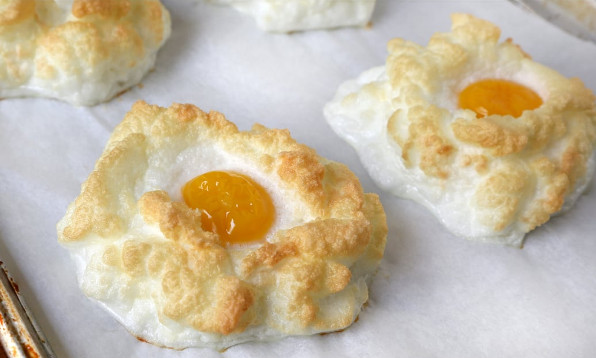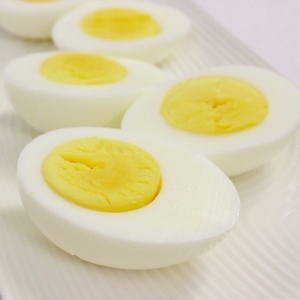Eggs are, arguably, the best breakfast food you can choose. But dieticians warn that, while eggs themselves are good for you, it’s what you put on them that can make them bad, indeed. And even before that, what you cook them in can make a huge difference in healthfulness and calorie count of your egg-based breakfast…
 Egg Clouds: Baked in the oven on a sheet of parchment paper – with no oil or fat whatsoever!
Egg Clouds: Baked in the oven on a sheet of parchment paper – with no oil or fat whatsoever!
We’ve covered the ‘Egg’ controversy in this space for ages: Are eggs good for you or not? Is the cholesterol in eggs bad for you? How often can you eat eggs before you endanger your health? Time for an update and a recap…
The good news
“Egg whites are an incredible vegetarian source of protein and the yolks are a powerhouse of vitamins and minerals including Vitamin A, B12, Selenium, Choline (important in cell structure + function) and lutein/zeaxanthin (both of which promote eye health),” says registered dietitian Lindsay Wengler. But who – really – eats only the whites, right?
The yolks are where the fat and cholsterol reside, and they’ve been selectively villainized for decades. But the reality has recently been revealed: egg yolks may harbour high calories, however the cholesterol in them does not materially effect your blood cholesterol level one way or the other!
So, eggs themselves are in the clear, as it currently stands. And the lab guys and gals calculate that the average person can enjoy as many as 1 a day (max of 5 per week recommended) without risking any serious health damage. But researchers at Harvard T.H. Chan School of Public Health also note that there are other foods, which provide many of the same nutrients as eggs, that are arguably more important to include in a healthy breakfast, including whole grains (in Breads and non-processed Cereals), fresh fruits and yogurt.
On the other hand
If you love your eggs fried, at high heat, over butter or Bacon Fat, you’re just asking for trouble, warns registered dietician Katherine Basbaum: “If you are frying eggs in butter, you may counteract some of the wonderful health benefits of eggs. Eggs are naturally high in protein and low in saturated fat, but as soon as you add butter to the mix, the saturated fat in your dish shoots up. This is something we don’t want, as excessive saturated fat in the diet is closely linked to heart disease.”
“The 2020-2025 Dietary Guidelines for Americans suggest keeping saturated fat intake to less than 10% of total calories per day,” adds registered dietician Tara Tomaino. But she also stresses that cooking eggs in breakfast bakes, quiches or other caserole-type dishes, or topping them with stuff like cheese and high-fat meats (like bacon, ham or sausage), “can detract from the high nutritional profile of eggs.” There’s a culinary understatement if ever I heard one!
Frying at high heat is also a no-no, because this practice, embraced particularly by restaurants and Saturday-morning ‘Dad’ chefs, can result in the production of harmful byproducts that have been linked to a number of cancers. “Cooking at high temperatures oxidizes oils, and when consumed this can trigger inflammation in the body,” says registered dietitian Rebecca Washuta.
At first glance, it seems like egg lovers just can’t win!
What you can do
First you can use less fat when cooking your eggs. No-stick pans and cooking sprays (which use only a thin film of oil to lubricate he pan) are also a good way to go. Better yet, make your eggs without any fat at all. One of my favourite ways to cook eggs is bake in the oven as Egg Clouds, or poach them on top of other dishes, as is done in the finishing step of preparing Indonesian Shakshuka!
Another of my favourite ways of making eggs in a fast, fun and exotic way is the Maracas Scrambled Eggs method. Place all the ingredients for for scrambled eggs (including your meat and veggie incousi9ons) in a 1-litre mason jar, affix cover tightly, and shake like a martini for 20-30 seconds. Then pour into a microwave-safe cooking vessel with lid (like a Pyrex dish) which has been lightly sprayed with cooking spray. The cooking spray is actually optional, if you don’t mind scraping some of the eggs from the bottom and sides of the dish with a spoon or spatula.
Close the lid and microwave on high for one minute.
After one minute, check and see if all the Egg mixture has cooked. If not, replace lid and mic for one more minute.
When all the Egg mixture has cooked, remove the cooking vessel lid and spoon the resulting fluffy, fragrant scrambled eggs onto a plate, into a bowl, or directly into a Taco Shell.
There are lots of other ways to prepare eggs with minimal or no fat, at lower temperatures. Plain old poaching and hard boiling, for example, come readily to mind…
And that’s the latest on eggs…
We’ll keep you posted as new developments come in (and they always do,it seems). But until then, enjoy your eggs responsibly!
~ Maggie J.

